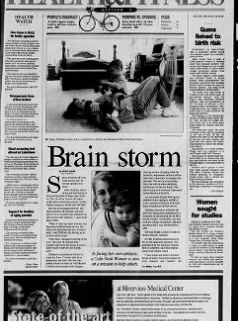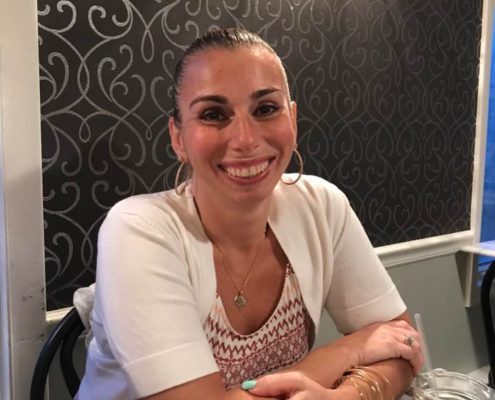Published in Arianna Huffington’s Website Thrive Global
Life was grand as a toddler, going on weekend trips with my parents, playing with my friends and listening to grandma as she shared one inspiring story after another about the good old days. What more could a child ask for than the love and comfort of her family?
Surprising life quickly took a turn for the worst and that pathway I was destined to journey became rocky as traumatic obstacles crossed my life path and took me on a different journey. A journey, one no child should have to experience.
The Beginning
At the age of five, I had contracted a sore throat and an ear infection. My mother had brought me to the doctor’s office that evening and the pediatrician had put me on penicillin and told my mother to have me rest in bed. No one thought much of it at the time.
I rested in bed and I was on the penicillin for about ten days. On the tenth night when she put me to bed, my lips were more red than usual. The next morning about 8:00 A.M., my mother woke up because she heard unusual noises coming from my room that sounded like I was choking on my saliva. She walked into my bedroom to find me in my bed turning blue and having a grand mal seizure. This was the first time I ever experienced a seizure.
During the seizure, I fell to the floor, my eyes rolled to the left and my whole body began to shake. My teeth began to chatter, and I started to foam at the mouth and choke on my saliva and my skin color began to turn bluish because of the lack of oxygen I was enduring.
My mother ran to the phone to call the ambulance and had me rushed to the hospital. I was rushed to the emergency room and brought to the isolation ward. They were clueless if any type of serious or contagious illness brought on the seizure.
They administered many tests to try to diagnose the cause of the grand mal seizure. The doctors finally concluded that the grand mal seizure came from a virus. This was not an ordinary virus. It was a virus known as encephalitis.
The doctors had told my parents that the bacteria from the ear infection had traveled to my brain and that the virus was still in my brain. They were told that the viral encephalitis had to leave my brain naturally on its own. I was in an induced coma for four days. After the 2nd day, my parents were told that if I survive, I would probably have severe brain damage or I could become paralyzed and paraplegic.
My parents were devastated, but they never gave up hope. On the fourth day, while I was in a coma, my father lay by my bedside and began praying to a saint in Greece. As he prayed he was visualizing the statue in front of his old church. In Greece, water would roll down this saint’s eyes. As my father raised his head and opened his eyes, he looked directly at me to find a teardrop rolling down my face. Immediately after I woke up. They tested me right away. I had no brain damage, but the infection had traveled to my brain and caused scar tissue damage, which left me with epilepsy. For years, I endured endless seizures.
My seizures finally became under control after years of tests, trail groups and trying every antiseizure medication known to man. My epileptologist gave me permission to drive a car, feeling that my safety was no longer in jeopardy or likely to endanger someone’s life while driving. I was so excited.
At eighteen, I was issued a license that right of passage so important for a young person striving for independence and autonomy. Since I have epilepsy, I was even more excited to get my license since I always felt different from the other kids and that I had something to prove. Now, the gap was closing and I was just like all the other teenagers, one of the gang, the cool girl in school with a license.
Picking my friends up and driving to the mall quickly became a ritual. We shopped until we dropped and enjoyed every precious moment. We helped each other pick clothes, buying like crazy until our wallets were empty. The morning after a shopping spree would find as at one or the others house, helping each other get into our new pants that we purposely bought two sizes smaller.
One of us would get on the bed and the other two would help pull up the pants. I can still hear Marie yelling at me to stop breathing and hold in my stomach!
No new purchase was sacred; we swapped our new clothes and could make three new outfits look like ten. As our closets grew, so did our friendships. We bonded, shopping being the experience that brought us closer. No matter how different we each were in personality, we all had a love for shopping in common.
At nineteen, life changed, as you would expect, it should for a young woman about to become an adult. Only my change wasn’t typical.
While I was driving with my boyfriend (who is now my husband) on a winding, country road in New Jersey, I suddenly went into a seizure. My muscles tightened, my arms curved to the left and my foot went all the way down on the gas pedal.
Our future together flashed before us as the car headed straight toward a telephone pole. Fighting me for the wheel was worse than fighting a boxer or wrestler. I had no control and while in the throes of the seizure, I had the strength of a couple of bouncers.
Finally, my boyfriend got control over the car, steering it safely away from the pole and bringing it to a stop.
By then my seizure had passed and a new era in my life began. An angel was watching over us and spared our lives that day, but my license was revoked and my days at the mall became fewer and more difficult to arrange.
Surprisingly, I never expected that not being able to drive whenever I desired would have such an impact on my life, but it did. I became a prisoner in my own home, no longer able to hop into the car and go to the mall, to Dunkin’ Donuts for a cup of coffee or Blockbusters for a video. I was at the mercy of other people’s schedules.
Grieving the loss of freedom
Not one to ask for people’s help, my isolation became chronic. I felt very alone even though I was a strong, independent person and I wanted to take care of myself. I wanted to be a successful woman working in New York, shopping her heart out after work then going to the bar to have enjoyed an evening martini with friends. But that idea wasn’t realistic; my dreams didn’t seem to have a chance.
My confidence was shaken, my self-esteem at an all-time low. How was I going to be a success? I had epilepsy. Where was my life going? What was my purpose? I was depressed, hiding from the world and feeling hopeless inside. Afraid to tell others how I felt, I was trapped.
Epilepsy not going to stop me
As time passed, I was accepted to Stockton University and with all odds against me, I was determined to succeed. I was put on this earth for a reason, and I was bound to succeed no matter how difficult the ride was going to be.
I remember like it was yesterday, I was in class and an aura came, I had a seizure and I woke up to a classroom in a dead of silence with all eyes focused on me. Even the guy I couldn’t stand had a face of remorse and sympathy. It was the worst feeling in the world. Then my professor, in a relaxed and friendly voice, asked me if I was OK and I said, “yes” and then my professor broke the ice by saying, “My roommate in college had epilepsy and he did just fine.”
Eventually, I graduated and then landed a job with a big corporation. I worked there for a while until one day I fell to the floor and had a seizure. One of the big corporate employees walked over me and kept going. Thirty minutes later his associate released me from my position.
Was I ever going to reach the level of success I always dreamed of achieving? Every time I took 2 steps forward I felt like my epilepsy knocked me back another three steps.
By then I was getting to marry my longtime love that I met after high school. I got married and helped my in-laws with the business they were starting. During this time after 3 years of writing, I finished the book I started in college, “Epilepsy You’re Not Alone.”
Letters from all over the US and Canada poured in and people thanked me for writing this book. One person even told me that they were on the verge of suicide, but they saw my book at Barnes and Noble’s and they read it, followed my advice and guidance and they gained purpose back into their life and the will to live.
It was then that I had realized how powerful words can be and how a simple book could make a dramatic change someone’s life.
It was then that I decided I want to be a writer, an advocate, a life coach. I wanted to help others like so many others had reached out to help me in my lowest and hardest times of life.
The Epilepsy Foundation invited me to Washington DC where I spoke in front of Congress about job discrimination. Afterward, I met Congressman Rush Holt who shook my hand, congratulated me on my courage and perseverance and shed a tear as he told me about heartwarming moments watching his sister grow up with Epilepsy.
During my years of writing in the health field and over 15 years of behind my belt, I began writing for a herbalist. I used many of things I learned and applied it to my own life. Amazingly, my seizures decreased, eventually stopped and fifteen years later I was able to drive again.
I was intrigued with herbals, vitamins, food for medicine, and the natural life (alternative medicine). For the next two years, I researched and collected valuable information and completed my book, The Complete Herbal Guide: A Natural Approach to Healing the Body and Maintaining Optimal Health Using Herbal Supplements, Vitamins, Minerals, Fruits, Vegetables and Alternative Medicine.
I started with a blog of 400, to a website of 10,000 to a redesigned website that brings 300,000 monthly visitors.
Some would be satisfied to accomplish what I’ve achieved with the struggles I have to face. Yet I am still determined to reach higher levels of success. I want to speak in front of large groups about the importance of a healthy lifestyle. I want to teach others about the power of positive thinking and most of all I want to help others who struggle will a disability. My mission is to make a difference. I want to help improve the lives of millions.
I realize no matter what age you are you can transform your life and create the life you always wanted for yourself. A life filled with happiness, inner peace, good health, and positivity.
Stacey Chillemi

Stacey Chillemi a mother of three is a popular and recognizable health and lifestyle reporter and expert, columnist and health host. Author of The Complete Guide to Natural Healing: A Natural Approach to Healing the Body and Maintaining Optimal Health Using Herbal Supplements, Vitamins, Minerals, Fruits, Vegetables and Alternative Medicine and Natural Remedies for Common Conditions: How to Prevent, Heal and Maintain Optimum Health Using Alternative Medicine, Herbals, Vitamins, and Food, along with 20 other published books, Stacey is the founder of The Complete Herbal Guide (thecompleteherbleguide.com). Stacey has been a guest on numerous lifestyle and health-related TV and radio programs, and is a recognized health and natural remedies expert, with over 20 years in practice as a Health Coach. Stacey has been a guest on the Dr. Oz Show, local news, and numerous radio shows.











 © 2024 The Advisor With Stacey Chillemi. All rights reserved.
© 2024 The Advisor With Stacey Chillemi. All rights reserved.